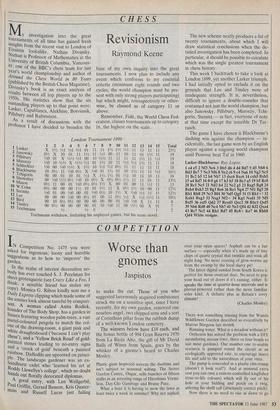CHESS
Revisionism
Raymond Keene
My investigation into the great tournaments of all time has gained fresh insights from the recent visit to London of Einstein lookalike, Nathan Divinsky. Nathan is Professor of Mathematics at.the University of British Columbia, Vancouv- er, one of the BBC's chess team for last year's world championship and author of Around the Chess World in 80 Years (published by the British Chess Magazine). Divinsky's book is an exact analysis of results between all top players up to the 1950s. His statistics show that the six oustanding players up to that point were: Lasker, Capablanca, Alekhine, Botvinnik, Pillsbury and Rubinstein. As a result of discussions with the professor I have decided to broaden the base of my own inquiry into the great tournaments. 1 now plan to include any event which conforms to my essential criteria (minimum eight rounds and two cycles; the world champion must be pre- sent with only strong players participating) but which might, retrospectively or other- wise, be classed as of category 11 or above.
Remember, Fide, the World Chess Fed- eration, classes tournaments up to category 16, the highest on the scale.
2 3 4 5 6 7 11/2 1/21 1/21 1/21 01 11 X 10 01 11 11/2 11 01 X 1/21/2 1/21 00 10 10 1/21/2 X 11/211/2 1/21 01 00 1/20 1/21/2 X 11/2 10 01/2 11 1/20 Olh X 1/20 00 01 10 01 1/21 X 1/20 1/21/2 01/2
h0 10 01/2
11 00 01 1/20 01/2 01/2 00 00 00 11/2 10 01 01 00 1/20 00 01 1/20 00 00 1/20 00 01/2 01 10 01/2 01/2 00 00 00 01/2 00 00 00 00 01 1/2 1/2 0 1 011/2 1/20 1/20 1/20 10 00 00 01/2 01/2 1/20 00 00 00
1 Lasker 2 Janowsky 3 Pillsbury 4 Maroczy 5 Schlechter 6 Blackburne 7 Tchigorin 8 Showalter 9 Mason 10 W.Cohn
11 Steinitz
12 Lee 13 Bird 14 Tinsley 15 Teichmann 8 9 10 11 12 13 14 15 Total
11 11/2 11/2 1/21 11 11 11 11 231/2 1/21 00 11 10 11 01 1V2 11 19 1/21/2 11 11 11 11 11/2 11 1/21 19 11/2 10 11 1/21 1/21 11/2 11 11 19 1/21 1/21 01/2 11 11 11 11 11 18 01 11/2 01 10 11/2 11 11 1/21 161/2 11/2 11/2 01 1/21 10 11 10 11 16 X 01/2 01/2 11/2 11 11 01 11 131/2 11/2 X 00 01 00 11 1/21 11 13 11/2 11 X 01/2 11/2 10 00 11 121/2 01/2 10 11/2 X 1/20 1/21 11 11 121/2 00 11 01/2 1/21 X 1/21 1/21/2 11 101/2 00 00 01 1/20 1/20 X 11 11 8 10 1/20 11 00 1/21/2 00 X 01 7 1 2 London Tournament 1899
Teichmann withdrew, forfeiting his unplayed games, but his score stood.
The new scheme neatly produces a list of twenty tournaments, about which I will draw statistical conclusions when the de- tailed investigation has been completed. In particular, it should be possible to calculate which was the single greatest tournament
in chess history.
This week I backtrack to take a look at London 1899, yet another Lasker triumph. I had initially opted to exclude it on the grounds that Lee and Tinsley were of inadequate strength. It is, nevertheless, difficult to ignore a double-rounder that contained not just the world champion, but also Janowsky, Pillsbury, Maroczy, Tchi- gorin, Steinitz — in fact, everyone of note at that time except the irascible Dr Tar- rasch.
The game I have chosen is Blackburne's
dashing win against the champion — in- cidentally, the last game won by an English player against a reigning world champion until Penrose beat Tal in 1960.
Lasker-Blackburne: Ruy Lopez.
1 e4 e5 2 Nf3 Nc6 3 Bb5 d6 4 d4 Bd7 5 d5 Nb8 6 Bd3 Bel 7 Nc3 Nf6 8 Ne2 c6 9 c4 Na6 10 Ng3 Nc5 11 Bc2 b5 12 b4 Nb7 13 dxc6 Bxc6 14 cxb5 BxbS 15 a4 Bd7 16 0-0 g6 17 h3 h5 18 Be3 a5 19 b5 Rc8 20 Rcl Nc5 21 Nd2 h4 22 Ne2 g5 23 Bxg5 Rg8 24 Bxh4 Bxh3 25 Bg3 Be6 26 Rel Ng4 27 Nfl Bg5 28 Rbl Rh8 29 Nc3 Bf4 30 Nd5 Qg5 31 f3 Rh1+! 32 Kxhl Bxg3 33 Nxg3 Nf2+ 34 Kgl Nxdl 35 Nf5 Bxf5 36 exf5 Qd2 37 Rexdl Qxc2 38 Rbcl Qxf5 39 Nb6 Rd8 40 Nc4 Nb7 41 Ne3 Qf4 42 Kf2 Qxa4 43 Rc7 Nc5 44 Rhl Rd7 45 Rc8+ Ke7 46 Rhh8 Qd4 White resigns.



























































 Previous page
Previous page